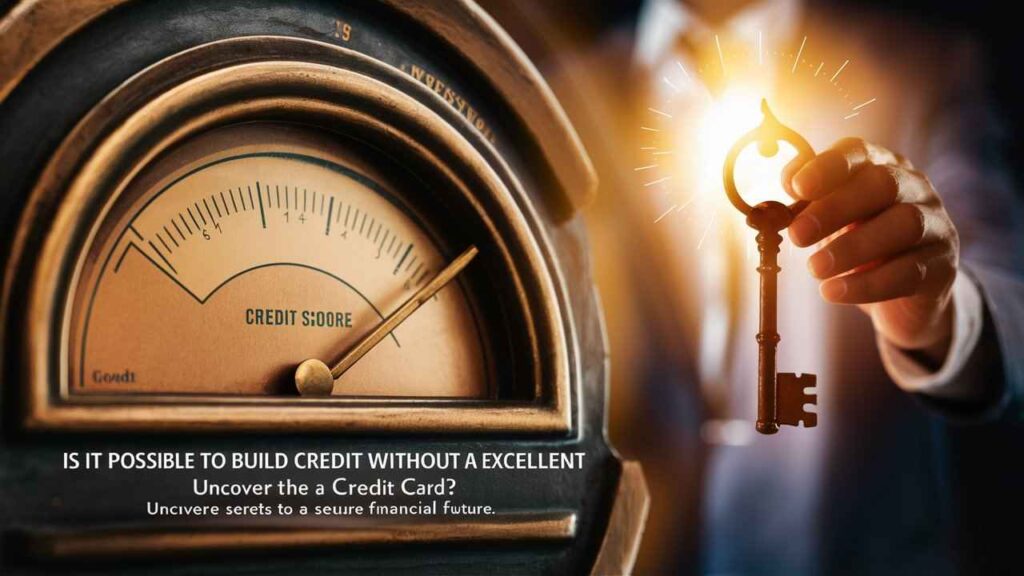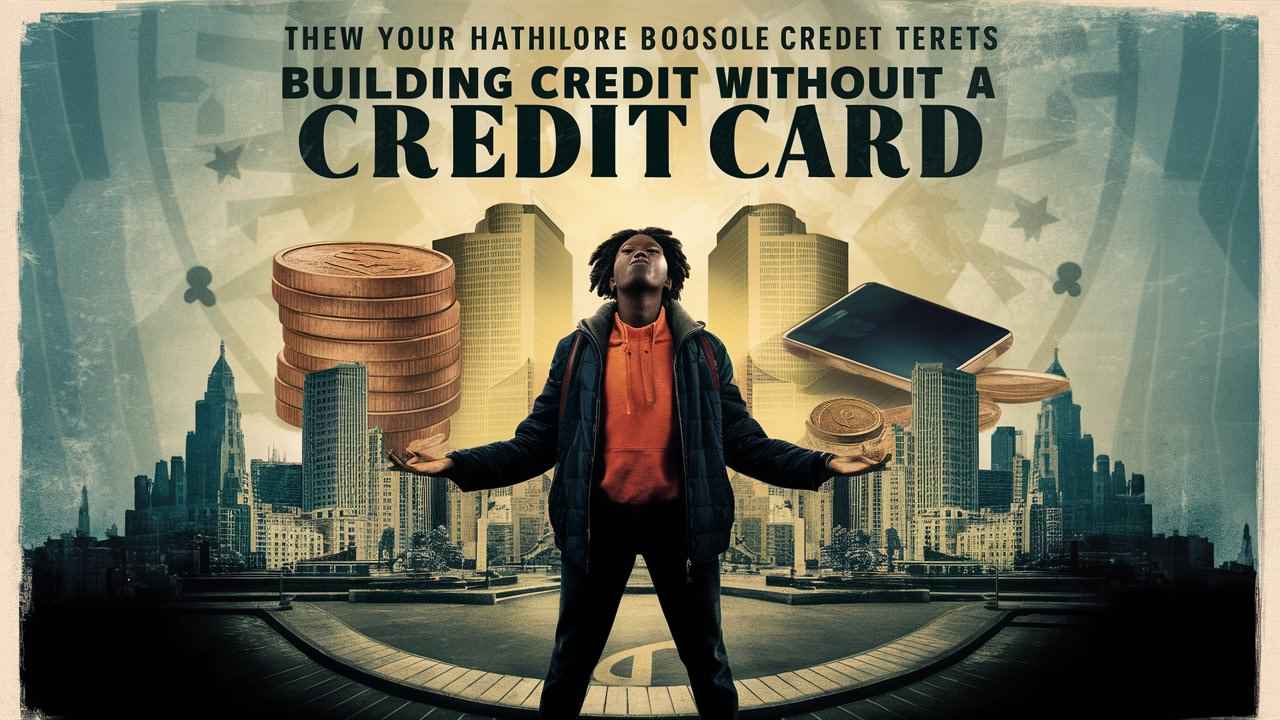Why Credit Matters (Even When You Hate the Idea)
Admit it: the word “credit” sends shivers down your spine. It feels like a mysterious club where the rules are made up, and the points don’t matter💵except they do. Your credit score affects everything from renting an apartment to snagging that dream job. Hate it all you want, but ignoring credit is like refusing to check the weather before a picnic. Prepare, and it won’t rain (as much).

The Big Question: Can You Really Build Credit Without a Credit Card?
Short answer? Yes. Long answer? Yes, but it requires creativity, patience, and maybe a sprinkle of audacity. While the traditional route involves plastic and swipes, there are plenty of alternatives that don’t involve a credit card. Let’s explore them and banish the misconception that a card is your only ticket to financial adulthood.
Debunking the Myth: Credit Cards Are Not Your Only Option
We’ve all heard the spiel: “You need a credit card to establish credit.” False. This outdated myth probably originated from the same people who thought fax machines would last forever. In reality, there are numerous ways to build credit that don’t involve signing your soul over to a piece of plastic.

What Exactly Is a Credit Score and Why Should You Care?
A credit score is essentially your financial reputation boiled down into a three-digit number. It tells lenders, landlords, and sometimes even employers how “trustworthy” you are when it comes to paying back what you owe. Ignore it at your peril💵it has the power to open doors or slam them shut.
How Credit Scores Are Calculated (No Math Required, We Promise)
Your score is a cocktail of factors:
- Payment history (the big one at 35%)
- Amounts owed (30%)
- Credit history length (15%)
- Credit mix (10%)
- New credit inquiries (10%)
It’s like making a smoothie. Skip an ingredient, and it might taste off💵or in this case, your score takes a nosedive.
The Role Credit Cards Play in Traditional Credit Building
Sure, credit cards are a convenient way to establish credit. They offer revolving credit, payment history, and often a chance to earn rewards. But their role is overstated. You can build a robust credit profile without ever touching one.

The Alternatives to Credit Cards
Rent Payments: Turn Your Landlord into a Credit Score Booster
Paying rent? Services like Experian Boost or RentTrack can report your on-time payments to credit bureaus. Turn your biggest monthly expense into a credit-building powerhouse.
Utility Bills: Keeping the Lights On Can Light Up Your Credit
Utilities don’t just keep your house running💵they can now power your credit score. Tools like Experian Boost let you use your phone, internet, and energy bills to impress lenders.
Subscription Services: Netflix Bingeing with a Credit-Building Bonus
Imagine your Netflix or Spotify addiction working in your favor. Certain credit-building apps can report subscription payments. Yes, your love for streaming can pay off💵literally.
Loans That Work Without a Credit Card
Personal Loans: Not Just for Emergencies
A personal loan can establish payment history and diversify your credit mix. Just make sure the terms don’t have you trapped in a financial circus.
Auto Loans: Drive Your Way to a Higher Credit Score
Your car isn’t just a means of transportation; it’s also a tool to build credit. Timely auto loan payments can rev up your score faster than a turbo engine.
Student Loans: Knowledge and Credit Score Growth
While student loans might feel like a life sentence, they can be credit builders if managed responsibly. Make consistent payments, and watch your score grow alongside your diploma collection.💵

Using Your Bank to Build Credit
Credit Builder Loans: Savings and Credit Growth in One
These nifty loans work by holding borrowed funds in a savings account until they’re paid off. Think of it as forced saving with a credit score bonus.
Secured Loans: Your Savings as Collateral
By leveraging your savings as collateral, secured loans give you access to credit while showing lenders you’re serious about repayment.💵
Direct Debit Magic: Show Your Responsibility
Set up automatic payments through your bank for loans or recurring bills. Consistency is king when you’re working to build credit.

Rethinking Payment Options
Buy Now, Pay Later Plans and Their Impact on Credit
Services like Afterpay and Klarna allow you to split purchases into payments. Some of these even report to credit bureaus, turning your shopping spree into a credit-building opportunity.
Digital Wallets and Their Role in Modern Credit Building
Apps like PayPal Credit offer short-term credit solutions that can help establish your score💵just don’t let it spiral into unchecked spending.
Peer-to-Peer Lending: The Credit-Building Wild West
Platforms like LendingClub connect borrowers with investors. Timely repayment here can add a shiny line item to your credit history.

Monitoring and Managing Your Credit
Why Checking Your Credit Report Is Non-Negotiable
Mistakes happen, even on credit reports. Regularly reviewing yours can catch errors and disputes before they snowball into financial chaos.
Free Tools and Services for Monitoring Your Credit Progress
From Credit Karma to Mint, plenty of free tools offer insights into your score and progress. Use them religiously.💵
Understanding Soft vs. Hard Inquiries (and Why It Matters)
Soft inquiries are harmless and invisible to lenders; hard inquiries, on the other hand, can ding your score. Knowing the difference keeps you informed and strategic.
Common Pitfalls to Avoid
The Dangers of Overreliance on Non-Traditional Methods
While alternative methods work, they can’t replace a well-rounded approach. Diversify your strategy to avoid stagnating your credit progress.
Scams That Target Credit Builders Without Credit Cards
Beware of companies promising quick credit fixes. If it sounds too good to be true, it probably is💵protect your wallet and your score.
The Fine Line Between Building Credit and Overextending Yourself
Credit-building is a marathon, not a sprint. Overcommitting to loans or payment plans can hurt more than help.
Conclusion
The Truth About Building Credit Without a Credit Card
Building credit without a credit card isn’t just possible💵it’s practical. With the right tools and strategies, you can forge a solid financial future.
Finding the Right Credit-Building Path for Your Lifestyle
Choose methods that align with your habits and goals. Whether it’s paying rent or leveraging loans, tailor your approach.
Final Thoughts: Building Credit Is Possible, Even Without the Plastic
Ditch the notion that a credit card is essential. With creativity, diligence, and a touch of persistence, you can master the art of credit-building sans plastic.💵
People Also Ask
How to Get 800 Credit Score in 45 Days?
Getting an 800 credit score in just 45 days is challenging but achievable if you already have a good foundation. Here are key steps:
- Pay all bills on time.
- Reduce your credit card balances to below 10% utilization.
- Correct any errors on your credit report.
- Avoid applying for new credit.
How Do I Build My Credit Score if I Can’t Get a Credit Card?
If you can’t get a credit card, try these alternatives:
- Use a credit builder loan: Offered by banks and credit unions.
- Become an authorized user: Join someone else’s credit card account.
- Report rent payments: Services like RentTrack can report rent to credit bureaus.
How Long Does It Take to Get a 700 Credit Score if You Have No Credit?
With consistent good credit behavior, it can take 6 months to a year to reach a 700 credit score, depending on the type of accounts you open and how well you manage them.
Can I Survive Without a Credit Card?
Yes, you can survive without a credit card, but it may limit financial opportunities. Alternatives include using debit cards, cash, or secured loans for building credit.
How to Build First-Time Credit?
- Apply for a secured credit card.
- Take out a credit builder loan.
- Use a cosigner to get approved for a loan or credit card.
- Report utility and rent payments through services like Experian Boost.
Is 650 a Good Credit Score?
A score of 650 is considered fair. It’s not bad but may lead to higher interest rates or limited approval for loans and credit cards.
What is a Bad Credit Score?
A bad credit score typically falls below 580 on the FICO scale, making it harder to qualify for credit or loans.
Can I Build Credit with a Debit Card?
No, debit card usage does not build credit because it doesn’t involve borrowing or repayments reported to credit bureaus.
Can I Get a Credit Card with No Credit History?
Yes, you can:
- Apply for secured credit cards.
- Look for student credit cards if you’re a student.
- Get a card with a cosigner.
Is it Easy to Build Credit with No Credit?
Building credit with no credit history requires time and patience. Secured credit cards and credit builder loans are effective ways to start.
What is a Perfect Credit Score?
A perfect credit score is 850 on the FICO scale, though anything above 800 is excellent and offers similar benefits.
Is it OK to Never Use a Credit Card?
Yes, but not using a credit card can limit your ability to build credit. Alternative methods like credit builder loans can be used instead.
Is it a Bad Thing to Have No Credit?
Having no credit can limit financial opportunities, such as qualifying for loans, renting apartments, or even securing some jobs.
Do You Build Credit if You Don’t Use a Credit Card?
Yes, you can build credit without a credit card by using credit builder loans, reporting rent payments, or becoming an authorized user.
How Do I Build Credit if I Have None?
- Start with a secured credit card.
- Take out a credit builder loan.
- Report rent and utility payments.
- Use a cosigner for loans or credit cards.
Who Looks at Your Credit Score?
- Lenders (e.g., banks, credit card companies).
- Landlords.
- Employers (in some cases).
- Insurance companies.
What is the Lowest Credit Score?
The lowest possible credit score is 300 on the FICO scale.
How Do I Fix My Credit Score Fast?
- Pay down credit card balances.
- Dispute errors on your credit report.
- Pay bills on time consistently.
- Avoid new credit applications.
How Many Credit Cards Should I Have?
There’s no set number, but most experts recommend 2-3 credit cards to maintain a good mix of credit and manageable accounts.









